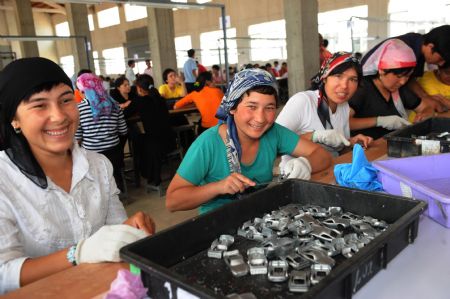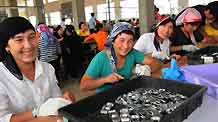Production Resumes in S China Toy Factory
Adjust font size:
 |
|
Xinjiang employees work at Xuri toy factory in Shaoguan City, south China's Guangdong Province, on July 7, 2009. More than 700 Xinjiang workers went back to work here on Tuesday after renovation of workshop, dormitory and dining-room. Their work had to be suspended after the fight between Uygur and Han ethnic workers at the toy factory on June 26. [Xinhua]
|
About 16,000 of the 18,000 workers at the Xuri Toy Factory in Shaoguan of Guangdong have returned to work by Tuesday, including more than 700 workers from the northwestern Xinjiang Uygur Autonomous Region.
A dispute among factory workers led to a fight involving hundreds of people on the morning of June 26, leaving two dead and118 injured.
Jin Ling, a female worker with the factory from Nanchang of east China's Jiangxi Province, left the factory on June 27 but returned the next day.
"When I came back, I found the production line was open but many workers were absent," she recalled. On that day, only about 3,000 workers went to work.
Life of Uygur workers
Sitting in her dormitory, which has a white mosquito tent, a red bedsheet, a round mirror and a textbook of mandarin Chinese, the 21-year-old Uygur girl Aysumgul Memet said she was learning while working.
"We were worried after the incident a few days ago, but now we are feeling better every day," she said.
Busa Regul was only 19 years old, but she is already head of a production group, in charge of gathering the products and registering them.
Although she said the work was tiring sometimes, the girl was satisfied with the salary -- 1,100 yuan to 1,600 yuan (US$161.8 to 235.3) a month.
"I want to learn more so as to find a better job in the future," she beamed.
According to Erbakri Turdi, Party chief of the Minxiang Village of Shufu County in Xinjiang, many migrant workers from the region had complaint when they just arrived.
"But the local government is trying to comfort them," he said.
After the clash, Turdi said that they helped all the Uygur workers to make phone calls to their families.
"Unlike reports from some media, most of the workers from Xinjiang are now willing to continue working here," he said.
A 24-hour clinic was set up in the factory with instructions in the Uygur language. A doctor said that all the medicines were free of charge.
Denouncing the lie
In the early hours of Sunday, the Urumqi police department got a tip-off that there were calls on Internet forums for demonstrations.
The riot began around 8:00 PM, when rioters started beating pedestrians and smashing buses. The violence soon spread to many other downtown areas.
Police said at least 156 people had died and more than 800 were injured in the riot.
Many workers in the Xuri Toy Factory were dissatisfied seeing some media citing the clash in the factory as the cause of the Urumqi riot on Sunday.
"We are so faraway from Xinjiang and I don't know why they make our factory the scapegoat," said Jin Ling, the worker from Jiangxi.
Her colleague Luo Shan also believed that the accusation was "unreasonable".
"The problem in our factory was that we couldn't understand each other's language," she said. "It lies with communication."
Despite the dispute, Luo said she would try to keep a good relationship with Uygur workers.
"We shared the same goal -- everybody is coming to earn a living," she said.
"I'd like to work with my colleagues, Hans and Uygurs alike."
(Xinhua News Agency July 8, 2009)
